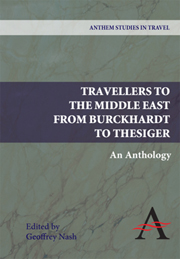Book contents
- Frontmatter
- Contents
- Acknowledgements
- Introduction
- PART ONE THE COMING OF EMPIRE 1800–1879
- The Ottoman Empire and Egypt
- 1 The Spirit of the East
- 2 Eothen
- 3 The Crescent and the Cross
- 4 Eastern Life, Present and Past
- 5 Visits to Monasteries of the Levant
- 6 Letters from Egypt
- Arabia
- Persia
- PART TWO COLONIALISM AND RESISTANCE 1880–1950
- Bibliography
1 - The Spirit of the East
from The Ottoman Empire and Egypt
Published online by Cambridge University Press: 05 March 2012
- Frontmatter
- Contents
- Acknowledgements
- Introduction
- PART ONE THE COMING OF EMPIRE 1800–1879
- The Ottoman Empire and Egypt
- 1 The Spirit of the East
- 2 Eothen
- 3 The Crescent and the Cross
- 4 Eastern Life, Present and Past
- 5 Visits to Monasteries of the Levant
- 6 Letters from Egypt
- Arabia
- Persia
- PART TWO COLONIALISM AND RESISTANCE 1880–1950
- Bibliography
Summary
Son of a Scottish laird by his second wife, after being educated partly abroad, Urquhart spent a few months at Woolwich Arsenal where, according to the 1898 DNB entry, he ‘acquired some knowledge of gunnery.‘Whilst at Oxford he was advised by Jeremy Bentham to travel in the Levant (Maehl, 1981: 512). His association with Ottoman Turkey began in 1827 when he fought briefly for the Greeks in their war of independence. After the war had ended he gained a name for himself by his report on the borders of the new state. In 1831 he accompanied Ambassador Extraordinary Sir Stratford Canning to Istanbul where he became first secretary at the British embassy. So began a career that saw Urquhart exercise an important influence on the public mind in the early and mid-Victorian periods as a propagandist for Turkey and a virulent enemy of Russia and Lord Palmerston. The 1830s was a decade in which he swapped diplomacy for political pamphleteering and intrigue and also succeeded in publishing The Spirit of the East: a Journal of Travels through Roumelia, a work that mixes unobtrusive political commentary with romantic descriptions of the wild and sublime scenery of Greece and Albania, and celebration of Ottoman culture and civility. From thereon political writings far outnumber works of travel – Lebanon: A History and a Diary of 1860, is a rare combination of the two.
- Type
- Chapter
- Information
- Travellers to the Middle EastAn Anthology, pp. 6 - 11Publisher: Anthem PressPrint publication year: 2009



